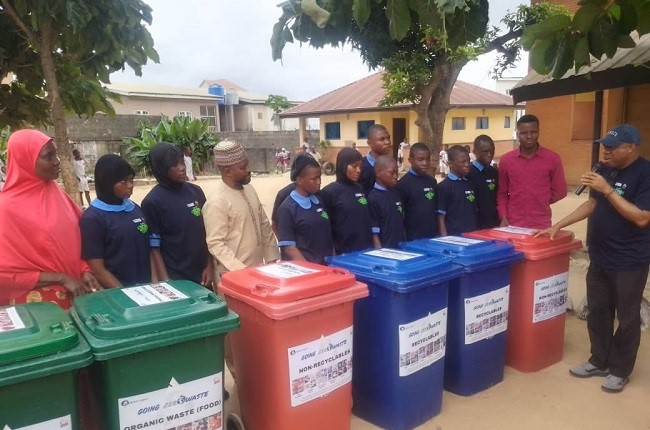In its drive towards ensuring a cleaner and healthier environment in Nigeria through effective waste management, the Sustainable Research and Action for Environmental Development (SRADev Nigeria) has inducted young Nigerians of school age as zero waste marshals so as to further strengthen waste management action plan in the country.

During the Zero Waste Project Launch at Ajao Junior High School, Ajao Estate in Anthony Village in Lagos, Dr. Leslei Adogame, the Executive Director of SRADev Nigeria, noted that the essence of the programme is to ensure effective waste management by adopting zero waste approach.
He said: “We realise that in Nigeria we needed to support the government, particularly the Lagos State Government is doing wonderfully well in the area of solid waste management, but they need some support, if we can entrench zero waste concept, that will go well. So, what we did was the implementation of a project where we identified residential estates that can imbibe the concept of zero waste. Today, we also involved Eko Akete High School, Antony High School and Ajao Estate High School.
“We took them through a six-month intensive training and selected students on what zero waste is all about, develop a model a global model you know for zero waste. We took them through, and they all learned.
“So, today, was just the launching to formally unveil them as zero waste marshals. We are going to be scaling up to other schools in Lagos and across the country very soon,” he stated.
In his remark, Dr. Essien Nsuabia, the Assistant General Manager, Waste Management Development of Lagos Waste Management Authority (LAWMA), pointed out that Nigerians must adopt principles of zero waste management namely reduce, reuse, recycle and recover.
According to him, there is huge importance of zero waste in municipal waste management such as it reduces waste being sent to landfills, it conserves natural resources as well as saving resources such as energy, water and land.
For more desired results to be achieved, Dr. Nsuabia noted that there is need to get more people involved, implement programmes to reduce waste generation, such as reducing single-use plastics and promoting sustainable consumption, increase recycling rates through education, outreach, and infrastructure development and promote composting of organic waste to reduce waste sent to landfills and create nutrient-rich soil amendments.
In her submission, Dr. Idowu Olufunke Oyetola, Tutor-General/Permanent Secretary Education District III, noted that the Zero Waste Project School Launch is an exemplary initiative aimed at ensuring waste are being converted into wealth aside the economic benefits, talking about having a cleaner, safer and healthier environment. “It is more encouraging when we have our young learners getting into this initiative. They can now cascade this information at the school level, at home and at different spaces they occupy So, it is highly commendable.”
Dr. Oyetola, represented by Mr. Iyun Abiodun Oladunjoye, Principal, Eko-Akete Senior Grammar School, opined that the project is the right call in the right direction, saying: “I know this is a pilot scheme, I believe it will cut across all other districts in a very short distance from now So, eventually Lagos State society as a whole will be fully saturated with the new global trend of converting waste to wealth.”
Talking about the overview of the project’s objectives and benefits, Victor Fabunmi, SRADeV’s Project/Programmes Manager, noted that the project trained a sum 50 students on the concept of zero waste and demonstration of waste management through a zero waste approach with provision of colour coded bins to the schools and engagement of waste pickers and also evaluates the students on the lessons learned on zero waste and identifying waste marshals.
Fabunmi highlighted the essence of waste segregation which informed different colours for the waste bins provided for the schools. According to him, the Green Bin is for organic waste -including food waste and vegetable residues, Blue or Yellow Bin is for recyclables like Bottles – glass/PET/HDPE, pure water sachet, food packs, metal scraps, electronic waste, Tetra pad – juice and yogurt packs, paper cartoon while the Red bin is meant for non-recyclables and residues Sachet/wrappers, diapers, sanitary pads, textile waste.
Highpoint of the event is the presentation of wastebins to Anthony Senior High School, Ajao Estate Junior High School as well as Eko- Akete Junior and Senior High Schools.
By Ajibola Adedoye
